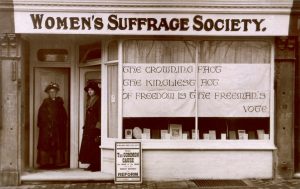From 1906 onwards, Tunbridge Wells was home to an extraordinarily active Votes for Women campaign. The largest and busiest organisation in town was the local branch of the NUWSS (the National Union of Women’s Suffrage Societies) whose non-militant members were known as ‘suffragists.’
When war was declared the suffragists were clear on what they should do. They immediately placed a notice in the window of their shop on Crescent Road, which read ‘All Political and Propaganda Work is suspended,’ and declared themselves available to support the local war effort. Following a request from Mayor Charles Emson, they re-opened their premises shortly afterwards as a depot where a team of volunteers sorted, mended and pressed clothes, which were then issued to convalescent soldiers and local families in need. Contributions of any ‘fashion, shape or size’ were welcomed.

NUWSS shop, Crescent Road (Women’s Library)
By the end of October 1914, the NUWSS depot was also providing clothing to the Belgian refugees who had begun arriving in town. On 11 December the Kent & Sussex Courier reported that in its first three months the depot had supplied 659 items of clothing to Belgians in Tunbridge Wells and 210 to the Belgian Committee at Folkestone. Items which were needed at that time included men’s pants, large skirts for women and pocket handkerchiefs.
The suffragists posted regular announcements in the press, reporting the numbers of items received and distributed and specific items that were required. At various points they requested boots (preferably well-mended and ready to wear), shoes, children’s clothes, men’s suits, women’s nightdresses and underwear (or calico for making it). On one occasion they even appealed for a bicycle on behalf of a Belgian girl who had been ordered to take exercise.
The local suffragists, who were mostly veteran campaigners, were not a young group. At a meeting in June 1915, their President Sarah Grand observed that older volunteers could sometimes be over-serious and appealed for younger ones ‘who could run up and down stairs and smile when Belgians came in.’
Lady Annette Matthews, Vice Chair of the local NUWSS branch, described some of the refugees who visited the depot in her war diary. These included a 21-year-old who had been too short-sighted for military service, a motor mechanic and his wife and a musician who had separated from his wife.
In February 1916 the Courier published a letter to Clothing Depot Secretary Gertrude Mosely from a Monsieur Raes, whose wife had both received and given assistance during her stay in Tunbridge Wells. He wrote (in French):
‘I take this opportunity to thank you, as well as the other ‘Misses’ and ladies of the depot, for all you did for my wife during her exile in England, and am also grateful for your kindnesses which greatly reassured her during those unhappy times.’
Demand for clothing from the Belgians diminished during 1916, although the depot continued operating until the end of 1917, by which time the needs of local families had also reduced. In three years over 11,000 garments passed through the suffragists’ hands.
The war effort brought together people who held differing views. Members of the Mayor’s Belgian Refugees Committee, which co-ordinated support in Tunbridge Wells, included Amelia Scott, Lydia Le Lacheur and several other local suffragists. In contrast the Mayor, his wife Margaret and at least one other lady member (Louisa Lushington) had until recently been actively involved in the local anti-suffrage organisation and campaigning against women having the vote. The experience of working together seems to have influenced the outlook of at least one of them; in January 1916 Margaret Emson’s views had changed to such an extent that she took the chair at a local suffragist meeting.
Notes
- In suspending campaigning and entering into the war effort, the Tunbridge Wells suffragists were following the line taken by their national organisation, the NUWSS.
- Individual suffragists were active in supporting the Belgian Refugees in many different ways. Notable amongst them was Amelia Scott who, together with her sister and in recognition of her contribution, was presented with a souvenir album by the Club Albert and Palme D’Or by the King and Queen of the Belgians.
Sources
- Kent & Sussex Courier (via British Newspaper Archive)
- Tunbridge Wells Advertiser
- Royal Tunbridge Wells Civic Society. The Shock of War: Tunbridge Wells: Life on the Home Front 1914-1919, Local History Monograph No. 13
